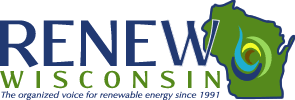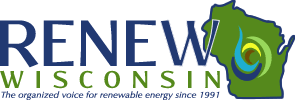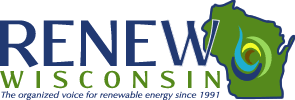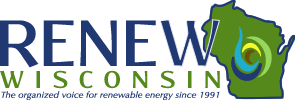by jboullion | Mar 11, 2013 | Uncategorized
A note from Michael Vickerman, RENEW’s Policy Director:
Senator Frank Lasee’s bill to allow municipalities to “opt out” of the reasonable standards contained in PSC 128, Wisconsin’s wind siting rule, is rapidly moving through the state legislature. A Senate Committee will hold a public hearing on Senate Bill 71 on Wednesday, March 13 at 12:00 PM CST. This bill would have an immediate impact on projects currently under development and will jeopardize the future of the Wisconsin wind industry.
We need your help opposing this bill.
It is absolutely imperative that policymakers hear from Wisconsin supply chain businesses, construction companies, project developers, installers, and manufacturers on this bill. If you are able, it would be of great help if you could travel to Madison to testify at the upcoming public hearing. If you are not able to come in person, please contact me directly as there are several other ways to help (direct calls, written testimony, lending your company’s name to our testimony, etc.)
Stopping this bill will take a united effort. We hope that we can count on your support.
The notice of the public hearing on SB 71 is below.
Thank you,
–Michael Vickerman Policy Director, RENEW Wisconsin.
mvickerman@renewwisconsin.org 608-255-4044 x. 2
Senate
PUBLIC
HEARING
Committee on
Government Operations, Public Works, and
Telecommunications
The committee
will hold a public hearing on the following items at the time specified
below:
Wednesday, March
13, 2013
12:00
PM
330
Southwest
Senate Bill
39
Relating to: the
notice and degree requirements for the examination to practice as a certified
public accountant.
By Senators L.
Taylor and Grothman; cosponsored by Representatives Kooyenga, Spiros, Knudson,
Marklein, Kapenga, Steineke, Smith, Bernier, Sanfelippo and
Stone.
Senate Bill
55
Relating to:
costs of replacement or relocation of certain municipal utility facilities
required by the construction of a freeway and eligibility for the safe drinking
water loan program.
By Senators
Cowles, Lasee and Lehman; cosponsored by Representatives Jacque, Weininger,
Bernier, Brooks, Kahl, Klenke and Bernard Schaber.
Senate Bill
71
Relating to:
limiting the regulation of wind energy systems by local
governments.
By Senators
Lasee, Ellis, Leibham, Grothman and Moulton; cosponsored by Representatives
Jacque, Murtha, Bies, Endsley, Kestell, Klenke, Knudson, LeMahieu, Spiros and
Thiesfeldt.
________________________
Senator Paul
Farrow
Chair
by jboullion | Mar 1, 2013 | Uncategorized
Only in Wisconsin will you find lawmakers who treat renewable
energy as though it were radioactive.
A legislator from Brown County, Rep. Andre Jacque, has introduced
a bill (AB 34) to incorporate nuclear energy within Wisconsin’s 14-year-old
renewable electricity standard. The bill defines the terms under which
utilities could apply the output from in-state nuclear power plants toward
their existing 10% requirement, which would be renamed the Advanced and
Renewable Portfolio Standard (ARPS). Right now, Wisconsin has three operating
nuclear reactors at two locations five miles apart along Lake Michigan.
Two of the three nuclear power stations–Point Beach units 1 and
2–are located within Rep. Jacque’s district. The adjoining district contains
the other nuclear unit , the 560-MW Kewaunee Nuclear Power Plant owned by
Dominion Resources, a Virginia-based utility holding company. Late in 2012,
Dominion announced that it would shut down and decommission Kewaunee this
spring, while cutting the plant’s 650-person workforce in half.
During its 39 years of operation, the Kewaunee plant pumped
millions of dollars into local government coffers, a substantial revenue flow
that will dry up some time after Dominion closes down the plant for good. It will be quite a challenge for Kewaunee and
Manitowoc counties to recover from the retirement of such a powerful economic
engine.
But let’s be clear about one thing: state legislation cannot bring
Kewaunee back to life. As Mark Kanz, a Dominion representative, said regarding
Jacque’s legislation: “What we needed was a long-term power purchase agreement.
I don’t see the market changing a whole lot any time in the near future, and
what this really was all about was economics.”
Over the last three years, Kewaunee has produced red ink as
prodigiously as it has electricity, to the tune of $362 million. One can
certainly understand why Dominion was so eager to sell it. But the only way an
expensive plant like Kewaunee can generate profits is by convincing nearby
utilities to pay a premium for its output under a long-term contract.
Even Rep. Jacque and the other bill sponsors know better than to
expect that outcome. As stated in their co-sponsorship memo: “A flood of cheap
natural gas on the energy market and the failure to negotiate a long-term power
purchase agreement make it very likely that Kewaunee will be closed … later
this year.”
But AB 34 wouldn’t provide any immediate assistance to Wisconsin’s
other nuclear generators at Point Beach either. That is because the legislation
specifically exempts nuclear generation that is sold under an existing contract
from qualifying for the renamed standard. With a power purchase agreement in
place until 2031, Point Beach doesn’t need a helping hand from state
government. At this point, one might be
forgiven for wondering who might benefit from this bill.
As for Wisconsin’s Renewable Electricity Standard (RES), there
isn’t much kick remaining in it. Collectively, the utilities’ renewable
percentages had already reached 8.88% by the end of 2011, and that was before
Wisconsin’s largest wind project commenced operations. Apart from a 50 MW biomass plant currently
under construction, the utilities do not have plans right now to add more renewable
generators to their systems. There is virtually no room left for any more
qualifying energy sources, be they renewable or, if AB 34 clears the
Legislature, nuclear.
Let’s make some comparisons. In 2006, the last year that both
Kewaunee and Point Beach were utility properties, nuclear contributed about 18%
of the electricity generated in Wisconsin, with each unit accounting for 6% of
that total. Coincidentally, that was the year Wisconsin enacted its current
RES, which specifies an increase in the percentage of renewable electricity
sold in Wisconsin from 4% in 2004 to 10% by 2015. That’s a six percentage point
difference, roughly equal to the output from Kewaunee or one of Point Beach’s
two units.
Now, AB 34’s sponsors could have specified higher targets after
2015 to create room for a Point Beach unit or two, but they chose not to. This
begs the question, how can a modest 10% renewable electricity standard that is
95% full accommodate the output of an existing Wisconsin nuclear station? How
does the math work here?
The answer, of course, is it doesn’t. How this bill would yield
anything of value to a nuclear plant operator is a complete mystery to anyone
with a sixth-grader’s grasp of arithmetic. At this point, it makes sense to
look through the more obscure provisions of AB 34 to pin down the underlying
intent of this legislation.
To my way of thinking, the bill sponsors expose their true motives
in the section dealing with so-called “resource” credits, which would replace
the way renewable energy credits are currently created and accounted for.
There, one stumbles upon a provision to remove the four-year limit on banking unused
renewable energy credits. Should this provision ever find its way into the
statutes, a utility would be able to apply kilowatt-hours generated from
decades past to their current requirements. No other state with an RES lets
their utilities bank surplus credits indefinitely.
When this proposal first surfaced in a stand-alone bill introduced
in 2011, renewable electricity producers of all stripes–private and
county-owned landfill gas generators,
dairy operations with biogas systems, small hydro owners, windpower companies
and solar PV owners— banded together to denounce this attack. They understood
all too well the real purpose behind giving renewable energy credits the gift
of perpetual life, which is to render them valueless, thereby giving utilities
all the room they need to drive the incremental price for renewable energy down
to zero. That bill died in 2012, but
since then the indefinite banking provision has been resurrected and now lies
deep within the nether reaches of AB 34.
What we have here, then, is a bill that uses the pretext of
preserving the state’s nuclear generating assets to dismantle what remains of
Wisconsin’s renewable energy policy. Not ones to accept the market realities
precipitating Kewaunee’s forced retirement, the bill authors decided to craft a
bill that aimed at hobbling the only other zero-carbon game in town: renewable
energy. The thought that seems to be
driving AB 34’s sponsors is this: If
nuclear is going down, renewables are going down with it.
AB 34 is not the only bill that aims to weaken Wisconsin’s RES.
Senator Glenn Grothman, a Republican from West Bend, is sponsoring legislation
to roll back the renewable requirements on utilities down to 2011 levels. What
is Sen. Grothman’s beef with renewable energy policy? Simply put, he does not want wind turbines
going up in his district, and he is convinced that the wind energy industry
would dry up and blow away without the
RES. Of course, if his initiative were to become law, its impact would extend
beyond windpower to all eligible renewable energy resources. In his quixotic
quest to stamp out windpower in his district, Grothman appears willing to
accept all the collateral damage to other renewables that would ensue.
To gauge how far renewable energy’s star has fallen in Wisconsin,
one need not go farther back in time than 2006, when a Republican-controlled
Legislature passed the 10% RES with only one dissenting vote. Even Senator
Frank Lasee, the state’s most prominent antiwind crusader, voted for the RES,
as did Grothman. But the bipartisanship
spirit alive in 2006 has completely curdled, and more than a handful of
legislators are taking up cudgels against an energy pathway they had welcomed
only seven years before.
Ironically, clean energy represents the best hope for creating new
jobs and business opportunities for the individuals and communities that will be
hit hard by Kewaunee’s retirement.
Between the 31 wind turbines erected in Kewaunee County 14 years ago and
biodigester systems serving local dairy farms and food producers, clean energy
has made substantial inroads in Manitowoc and Kewaunee counties, and has the
potential to deliver much more. But progress will be difficult to attain when
local legislators would rather score cheap political points than produce an
energy bill that might actually benefit their constituents.
Michael
Vickerman is program and policy director of RENEW Wisconsin, a sustainable
energy advocacy organization. RENEW
Wisconsin is an independent, nonprofit 501(c)(3) that leads and represents
businesses, and individuals who seek more clean, renewable energy in
Wisconsin. More information on RENEW’s Web site at www.renewwisconsin.org.

by jboullion | Feb 28, 2013 | Uncategorized
222 S. Hamilton, Madison, WI 53704
Immediate Release February 26, 2013
More Information
Don Wichert, Executive Director
608.255.4044, ext. 1
RENEW Petitions PSC to Improve Interconnection Rules
RENEW Wisconsin (RENEW) filed a petition on February 22 asking the Public Service Commission (PSCW) to simplify the process under which distributed generators can connect their generators to Wisconsin’s electrical grid. The vast majority of these small generating facilities are fueled with locally available renewable energy resources like biogas, solar, and wind.
RENEW’s filing grew out of a year-long study that assessed how Wisconsin’s 10-year old interconnection rule (PSC 119) compares with best practices established in other states.
“We found that Wisconsin’s outdated rules hurts distributed generators by adding complexity, time, and cost to the interconnection process ,” said Don Wichert, RENEW’s interim Executive Director and study coordinator. “Most of the renewable energy systems coming on line now are owned by non-utility generators. Fixing the problems in PSC 119 will lead to more renewable energy systems going in faster and at a lower cost. Supported by 86 companies, organizations, and individuals, RENEW’s petition identified 10 specific changes that, if adopted by the PSC, would align Wisconsin’s interconnection procedures with national best practices.
“Customer-owned renewable energy systems save ratepayers money in many ways”, said Wichert. “Because they offset electrical needs right where the electricity is being used, distributed renewables supply clean electricity in a reliable and affordable manner, avoiding potentially expensive investments in central generating plants and costly transmission lines. Moreover, they create jobs and support local businesses. These are all positive public policy goals”, Wichert said.
END
RENEW Wisconsin is an independent, nonprofit 501(c)(3) that leads and represents businesses, organizations, and individuals who seek more clean, renewable energy in Wisconsin. More information on RENEW’s website: www.renewwisconsin.org.

by jboullion | Feb 28, 2013 | Uncategorized
222 S. Hamilton, Madison, WI 53704
Immediate Release February 26, 2013
More Information
Don Wichert, Executive Director
608.255.4044, ext. 1
RENEW Petitions PSC to Improve Interconnection Rules
RENEW Wisconsin (RENEW) filed a petition on February 22 asking the Public Service Commission (PSCW) to simplify the process under which distributed generators can connect their generators to Wisconsin’s electrical grid. The vast majority of these small generating facilities are fueled with locally available renewable energy resources like biogas, solar, and wind.
RENEW’s filing grew out of a year-long study that assessed how Wisconsin’s 10-year old interconnection rule (PSC 119) compares with best practices established in other states.
“We found that Wisconsin’s outdated rules hurts distributed generators by adding complexity, time, and cost to the interconnection process ,” said Don Wichert, RENEW’s interim Executive Director and study coordinator. “Most of the renewable energy systems coming on line now are owned by non-utility generators. Fixing the problems in PSC 119 will lead to more renewable energy systems going in faster and at a lower cost. Supported by 86 companies, organizations, and individuals, RENEW’s petition identified 10 specific changes that, if adopted by the PSC, would align Wisconsin’s interconnection procedures with national best practices.
“Customer-owned renewable energy systems save ratepayers money in many ways”, said Wichert. “Because they offset electrical needs right where the electricity is being used, distributed renewables supply clean electricity in a reliable and affordable manner, avoiding potentially expensive investments in central generating plants and costly transmission lines. Moreover, they create jobs and support local businesses. These are all positive public policy goals”, Wichert said.
END
RENEW Wisconsin is an independent, nonprofit 501(c)(3) that leads and represents businesses, organizations, and individuals who seek more clean, renewable energy in Wisconsin. More information on RENEW’s website: www.renewwisconsin.org.

by jboullion | Feb 28, 2013 | Uncategorized
222 S. Hamilton, Madison, WI 53704
Immediate Release February 26, 2013
More Information
Don Wichert, Executive Director
608.255.4044, ext. 1
RENEW Petitions PSC to Improve Interconnection Rules
RENEW Wisconsin (RENEW) filed a petition on February 22 asking the Public Service Commission (PSCW) to simplify the process under which distributed generators can connect their generators to Wisconsin’s electrical grid. The vast majority of these small generating facilities are fueled with locally available renewable energy resources like biogas, solar, and wind.
RENEW’s filing grew out of a year-long study that assessed how Wisconsin’s 10-year old interconnection rule (PSC 119) compares with best practices established in other states.
“We found that Wisconsin’s outdated rules hurts distributed generators by adding complexity, time, and cost to the interconnection process ,” said Don Wichert, RENEW’s interim Executive Director and study coordinator. “Most of the renewable energy systems coming on line now are owned by non-utility generators. Fixing the problems in PSC 119 will lead to more renewable energy systems going in faster and at a lower cost. Supported by 86 companies, organizations, and individuals, RENEW’s petition identified 10 specific changes that, if adopted by the PSC, would align Wisconsin’s interconnection procedures with national best practices.
“Customer-owned renewable energy systems save ratepayers money in many ways”, said Wichert. “Because they offset electrical needs right where the electricity is being used, distributed renewables supply clean electricity in a reliable and affordable manner, avoiding potentially expensive investments in central generating plants and costly transmission lines. Moreover, they create jobs and support local businesses. These are all positive public policy goals”, Wichert said.
END
RENEW Wisconsin is an independent, nonprofit 501(c)(3) that leads and represents businesses, organizations, and individuals who seek more clean, renewable energy in Wisconsin. More information on RENEW’s website: www.renewwisconsin.org.

by jboullion | Feb 28, 2013 | Uncategorized
222 S. Hamilton, Madison, WI 53704
Immediate Release February 26, 2013
More Information
Don Wichert, Executive Director
608.255.4044, ext. 1
RENEW Petitions PSC to Improve Interconnection Rules
RENEW Wisconsin (RENEW) filed a petition on February 22 asking the Public Service Commission (PSCW) to simplify the process under which distributed generators can connect their generators to Wisconsin’s electrical grid. The vast majority of these small generating facilities are fueled with locally available renewable energy resources like biogas, solar, and wind.
RENEW’s filing grew out of a year-long study that assessed how Wisconsin’s 10-year old interconnection rule (PSC 119) compares with best practices established in other states.
“We found that Wisconsin’s outdated rules hurts distributed generators by adding complexity, time, and cost to the interconnection process ,” said Don Wichert, RENEW’s interim Executive Director and study coordinator. “Most of the renewable energy systems coming on line now are owned by non-utility generators. Fixing the problems in PSC 119 will lead to more renewable energy systems going in faster and at a lower cost. Supported by 86 companies, organizations, and individuals, RENEW’s petition identified 10 specific changes that, if adopted by the PSC, would align Wisconsin’s interconnection procedures with national best practices.
“Customer-owned renewable energy systems save ratepayers money in many ways”, said Wichert. “Because they offset electrical needs right where the electricity is being used, distributed renewables supply clean electricity in a reliable and affordable manner, avoiding potentially expensive investments in central generating plants and costly transmission lines. Moreover, they create jobs and support local businesses. These are all positive public policy goals”, Wichert said.
END
RENEW Wisconsin is an independent, nonprofit 501(c)(3) that leads and represents businesses, organizations, and individuals who seek more clean, renewable energy in Wisconsin. More information on RENEW’s website: www.renewwisconsin.org.




